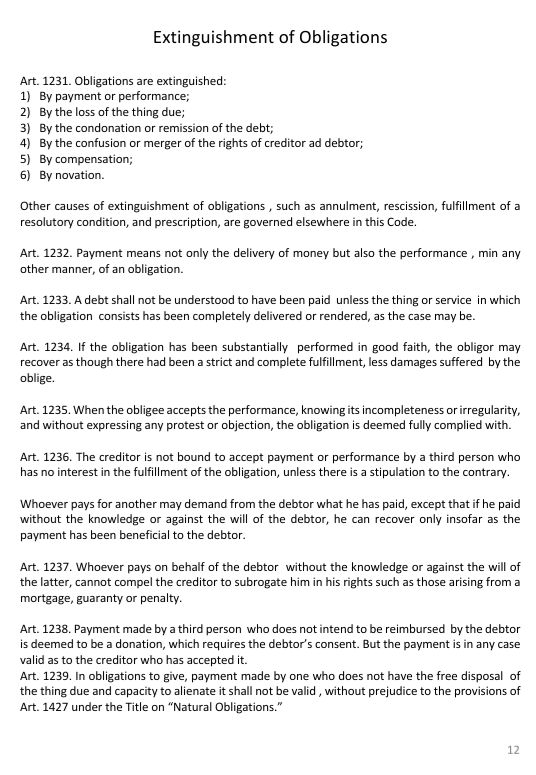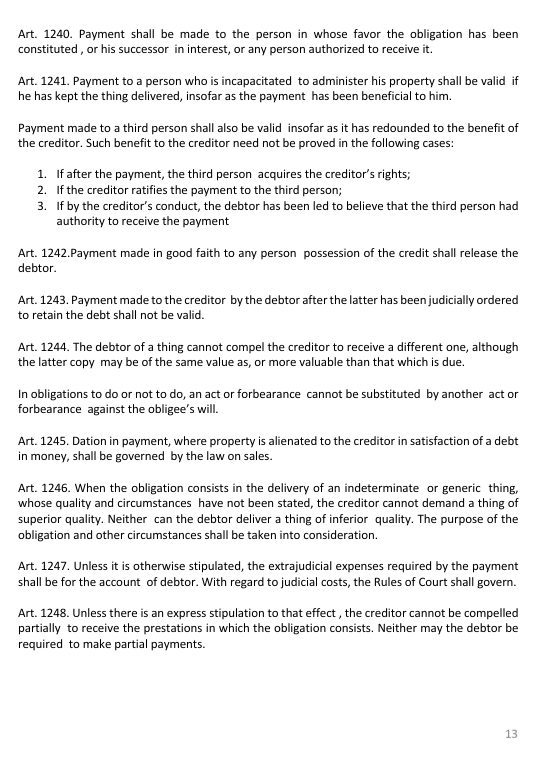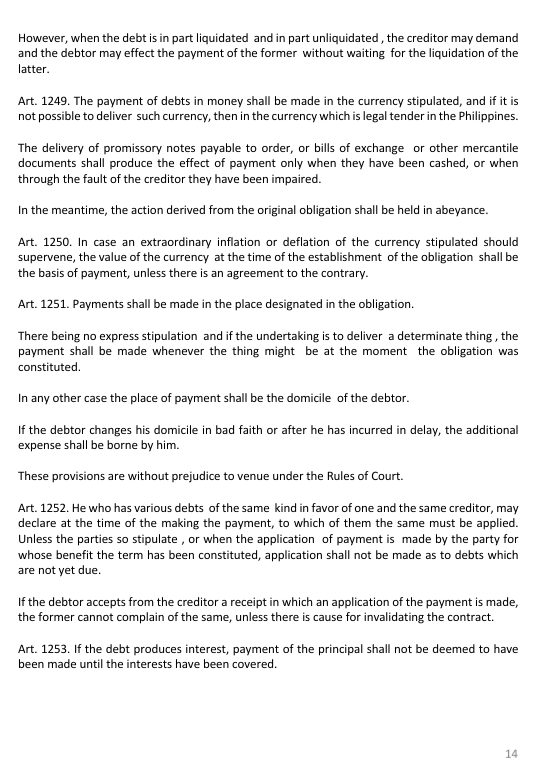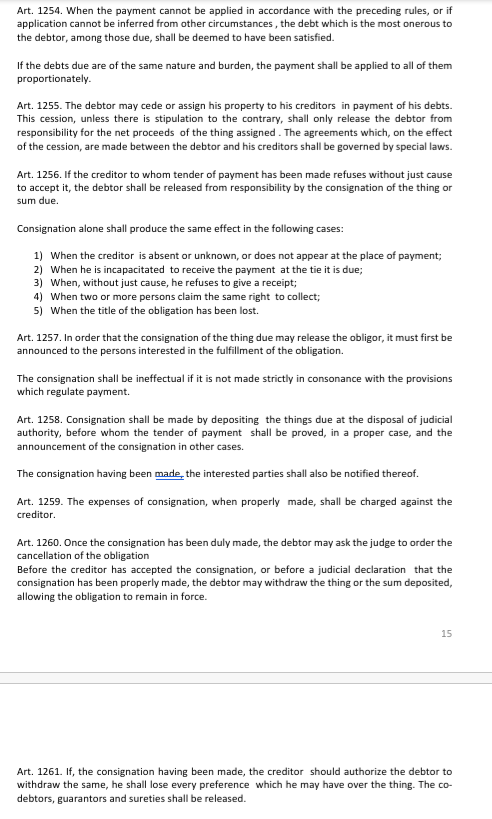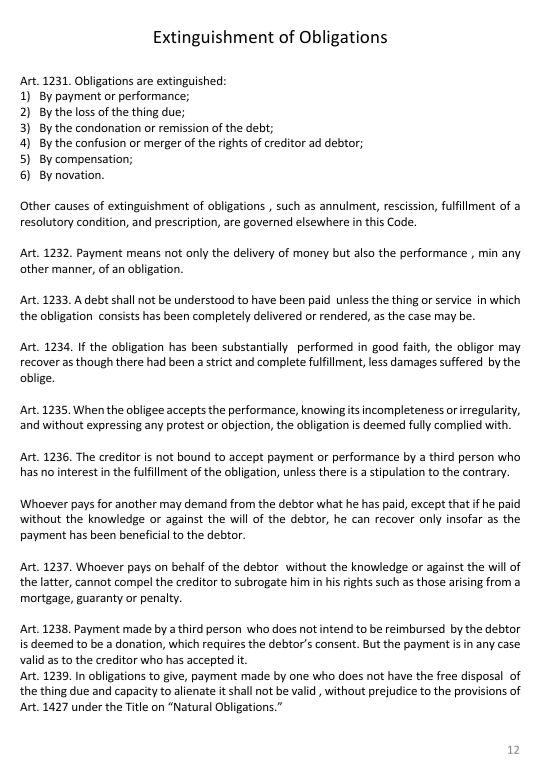
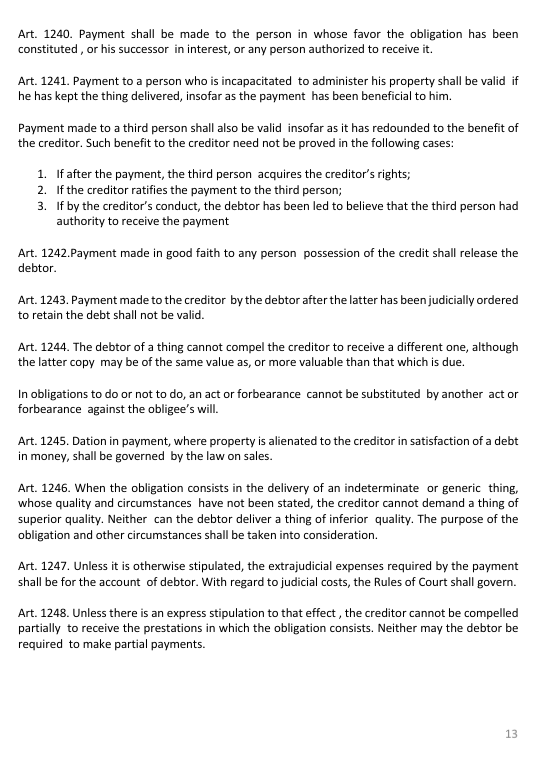
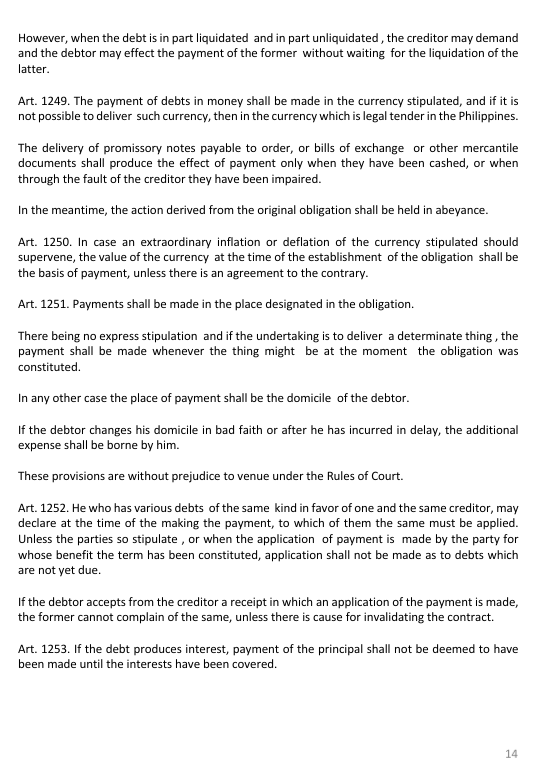
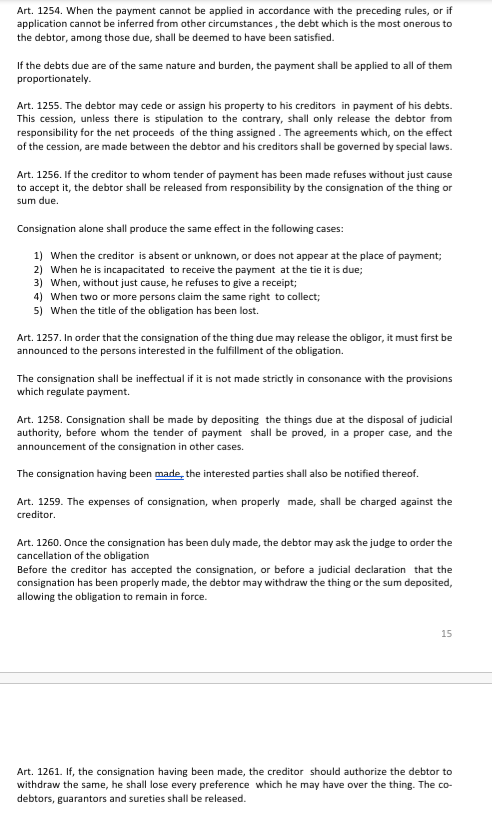
Reflection Paper for this
What have you learned in Extinguishment of Obligations
Extinguishment of Obligations Art. 1231. Obligations are extinguished: 1) By payment or performance; 2) By the loss of the thing due; 3) By the condonation or remission of the debt; 4) By the confusion or merger of the rights of creditor ad debtor; 5) By compensation; 6) By novation. Other causes of extinguishment of obligations , such as annulment, rescission, fulfillment of a resolutory condition, and prescription, are governed elsewhere in this Code. Art. 1232. Payment means not only the delivery of money but also the performance , min any other manner, of an obligation. Art. 1233. A debt shall not be understood to have been paid unless the thing or service in which the obligation consists has been completely delivered or rendered, as the case may be. Art. 1234. If the obligation has been substantially performed in good faith, the obligor may recover as though there had been a strict and complete fulfillment, less damages suffered by the oblige. Art. 1235. When the obligee accepts the performance, knowing its incompleteness or irregularity, and without expressing any protest or objection, the obligation is deemed fully complied with. Art. 1236. The creditor is not bound to accept payment or performance by a third person who has no interest in the fulfillment of the obligation, unless there is a stipulation to the contrary. Whoever pays for another may demand from the debtor what he has paid, except that if he paid without the knowledge or against the will of the debtor, he can recover only insofar as the payment has been beneficial to the debtor. Art. 1237. Whoever pays on behalf of the debtor without the knowledge or against the will of the latter, cannot compel the creditor to subrogatim in his rights such as those arising from a mortgage, guaranty or penalty. Art. 1238. Payment made by a third person who does not intend to be reimbursed by the debtor is deemed to be a donation, which requires the debtor's consent. But the payment is in any case valid as to the creditor who has accepted it. Art. 1239. In obligations to give, payment made by one who does not have the free disposal of the thing due and capacity to alienate it shall not be valid , without prejudice to the provisions of Art. 1427 under the Title on "Natural Obligations." 12Art. 1240. Payment shall be made to the person in whose favor the obligation has been constituted , or his successor in interest, or any person authorized to receive it. Art. 1241. Payment to a person who is incapacitated to administer his property shall be valid if he has kept the thing delivered, insofar as the payment has been beneficial to him. Payment made to a third person shall also be valid insofar as it has redounded to the benefit of the creditor. Such benefit to the creditor need not be proved in the following cases: 1. If after the payment, the third person acquires the creditor's rights; 2. If the creditor ratifies the payment to the third person; 3. If by the creditor's conduct, the debtor has been led to believe that the third person had authority to receive the payment Art. 1242. Payment made in good faith to any person possession of the credit shall release the debtor. Art. 1243. Payment made to the creditor by the debtor after the latter has been judicially ordered to retain the debt shall not be valid. Art. 1244. The debtor of a thing cannot compel the creditor to receive a different one, although the latter copy may be of the same value as, or more valuable than that which is due. In obligations to do or not to do, an act or forbearance cannot be substituted by another act or forbearance against the obligee's will. Art. 1245. Dation in payment, where property is alienated to the creditor in satisfaction of a debt in money, shall be governed by the law on sales. Art. 1246. When the obligation consists in the delivery of an indeterminate or generic thing, whose quality and circumstances have not been stated, the creditor cannot demand a thing of superior quality. Neither can the debtor deliver a thing of inferior quality. The purpose of the obligation and other circumstances shall be taken into consideration. Art. 1247. Unless it is otherwise stipulated, the extrajudicial expenses required by the payment shall be for the account of debtor. With regard to judicial costs, the Rules of Court shall govern. Art. 1248. Unless there is an express stipulation to that effect , the creditor cannot be compelled partially to receive the prestations in which the obligation consists. Neither may the debtor be required to make partial payments. 13However, when the debt is in part liquidated and in part unliquidated , the creditor may demand and the debtor may effect the payment of the former without waiting for the liquidation of the latter. Art. 1249. The payment of debts in money shall be made in the currency stipulated, and if it is not possible to deliver such currency, then in the currency which is legal tender in the Philippines. The delivery of promissory notes payable to order, or bills of exchange or other mercantile documents shall produce the effect of payment only when they have been cashed, or when through the fault of the creditor they have been impaired. In the meantime, the action derived from the original obligation shall be held in abeyance. Art. 1250. In case an extraordinary inflation or deflation of the currency stipulated should supervene, the value of the currency at the time of the establishment of the obligation shall be the basis of payment, unless there is an agreement to the contrary. Art. 1251. Payments shall be made in the place designated in the obligation. There being no express stipulation and if the undertaking is to deliver a determinate thing , the payment shall be made whenever the thing might be at the moment the obligation was constituted. In any other case the place of payment shall be the domicile of the debtor. If the debtor changes his domicile in bad faith or after he has incurred in delay, the additional expense shall be borne by him. These provisions are without prejudice to venue under the Rules of Court. Art. 1252. He who has various debts of the same kind in favor of one and the same creditor, may declare at the time of the making the payment, to which of them the same must be applied. Unless the parties so stipulate , or when the application of payment is made by the party for whose benefit the term has been constituted, application shall not be made as to debts which are not yet due. If the debtor accepts from the creditor a receipt in which an application of the payment is made, the former cannot complain of the same, unless there is cause for invalidating the contract. Art. 1253. If the debt produces interest, payment of the principal shall not be deemed to have been made until the interests have been covered. 14Art. 1254. When the payment cannot be applied in accordance with the preceding rules, or if application cannot be inferred from other circumstances , the debt which is the most onerous to the debtor, among those due, shall be deemed to have been satisfied. If the debts due are of the same nature and burden, the payment shall be applied to all of them proportionately. Art. 1255. The debtor may cede or assign his property to his creditors in payment of his debts. This cession, unless there is stipulation to the contrary, shall only release the debtor from responsibility for the net proceeds of the thing assigned . The agreements which, on the effect of the cession, are made between the debtor and his creditors shall be governed by special laws. Art. 1256. If the creditor to whom tender of payment has been made refuses without just cause to accept it, the debtor shall be released from responsibility by the consignation of the thing or sum due. Consignation alone shall produce the same effect in the following cases: 1) When the creditor is absent or unknown, or does not appear at the place of payment; 2) When he is incapacitated to receive the payment at the tie it is due; 3) When, without just cause, he refuses to give a receipt; 4) When two or more persons claim the same right to collect; 5) When the title of the obligation has been lost. Art. 1257. In order that the consignation of the thing due may release the obligor, it must first be announced to the persons interested in the fulfillment of the obligation. The consignation shall be ineffectual if it is not made strictly in consonance with the provisions which regulate payment. Art. 1258. Consignation shall be made by depositing the things due at the disposal of judicial authority, before whom the tender of payment shall be proved, in a proper case, and the announcement of the consignation in other cases. The consignation having been made, the interested parties shall also be notified thereof. Art. 1259. The expenses of consignation, when properly made, shall be charged against the creditor. Art. 1260. Once the consignation has been duly made, the debtor may ask the judge to order the cancellation of the obligation Before the creditor has accepted the consignation, or before a judicial declaration that the consignation has been properly made, the debtor may withdraw the thing or the sum deposited, allowing the obligation to remain in force. 15 Art. 1261. If, the consignation having been made, the creditor should authorize the debtor to withdraw the same, he shall lose every preference which he may have over the thing. The co- debtors, guarantors and sureties shall be released




